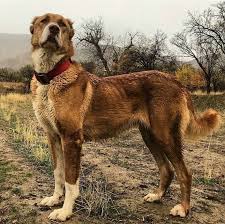
Kuchi
Conditions of detention
Kuchi dogs thrive in rural or semi-rural environments where they have plenty of space to roam and perform their guarding duties. They are best suited for homes with large, secure yards or farms.
Useful Fact: Kuchi dogs are highly adaptable to extreme weather conditions, making them suitable for both hot deserts and cold mountainous regions.
Nutrition and diet
A balanced diet rich in high-quality protein, fats, and essential nutrients is crucial for a Kuchi’s health. Both high-quality commercial dog food and well-prepared homemade diets can meet their nutritional needs.
Useful Fact: Due to their active nature and large size, Kuchi dogs may require more food than average dogs, especially during their growth phases and active working periods.
Health
Kuchi dogs are generally healthy with a lifespan of 10-14 years. They can be prone to certain genetic conditions such as hip dysplasia and bloat, but overall they are robust and resilient.
Useful Fact: Regular veterinary check-ups, maintaining a healthy diet, and ensuring proper exercise are essential for preventing common health issues in Kuchi dogs.
Grooming and care
Kuchi dogs have a thick double coat that requires regular grooming. Their coat can vary in length and texture, often shedding seasonally, which necessitates frequent brushing to manage loose hair and maintain coat health.
Useful Fact: During shedding seasons, typically twice a year, more frequent brushing is recommended to manage their dense fur.
Education and training
Kuchi dogs are intelligent and independent, often requiring a firm and consistent approach to training. Positive reinforcement methods work best, as these dogs respond well to respectful and fair handling.
Useful Fact: Early socialization and obedience training are crucial for Kuchi dogs to develop into well-mannered adults, helping them balance their guarding instincts with sociability.
Toys and entertainment
Kuchi dogs enjoy toys that challenge their minds and provide physical exercise. They particularly love activities that involve guarding or protecting, as well as interactive toys that stimulate their intelligence.
Useful Fact: Providing toys that encourage mental stimulation and physical activity can help prevent boredom and destructive behaviors in Kuchi dogs.
Safety
Ensure your Kuchi has a secure, fenced yard to prevent them from wandering, as their strong protective instincts can lead them to patrol large areas.
Useful Fact: Kuchi dogs are naturally alert and make excellent watchdogs, but their protective instincts should be managed with proper training to prevent over-guarding.
Accessories
A sturdy leash, comfortable harness, and ID tags are essential for your Kuchi’s safety during walks and outings.
Useful Fact: Due to their size and strength, Kuchi dogs benefit from wearing a harness rather than a collar, as it helps distribute pressure evenly and prevents neck strain during walks.
Socialization
Early and continuous socialization is crucial for Kuchi dogs to ensure they are comfortable around people, other dogs, and different environments.
Useful Fact: Positive socialization experiences from a young age can help Kuchi dogs develop into well-adjusted adults, reducing the likelihood of fear or aggression.
Travel and Transportation
Kuchi dogs can travel well if accustomed to it from a young age. Ensure they have a comfortable crate or seatbelt harness for car rides.
Useful Fact: Regular short trips can help your Kuchi become more comfortable with travel and reduce anxiety during longer journeys.
Behavior and psychology
Kuchi dogs are known for their loyalty, intelligence, and strong protective instincts. Understanding their behavior and providing appropriate outlets for their energy is important.
Useful Fact: Mental stimulation through training and interactive play is as important as physical exercise for a Kuchi’s well-being.
Legal aspects
Owning a Kuchi may come with specific legal requirements depending on your location, such as licensing, microchipping, and adherence to leash laws.
Useful Fact: Research local regulations and ensure you comply with any breed-specific legislation or requirements.


